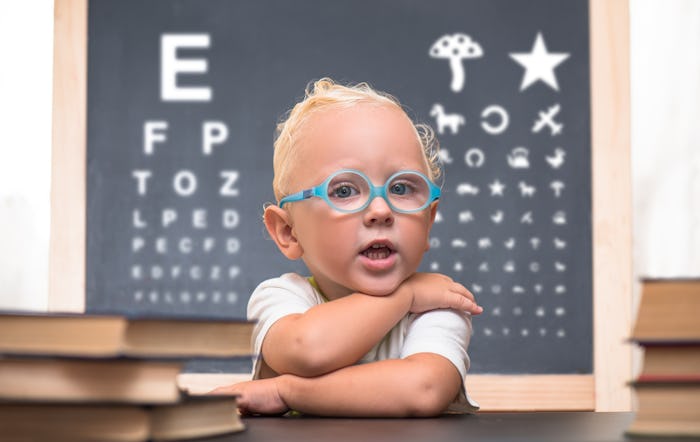Life
Early Signs That Your Baby Needs Glasses, According To An Optometrist
Until your child learns to talk, figuring out their needs and addressing any problems takes a bit of guess work. While an older kid squinting across the room at the TV set or struggling to see the board in school is an obvious tip off that you need to schedule a visit to the eye doctor, the signs aren't as clearcut with a baby. But vision problems can pop up at any age, and it's important to take action as soon as possible. Here are some early signs that your baby needs glasses, so you can address the issue sooner than later.
I spoke with Dr. Tayla Meade of Vista Eye Care to find out the red flags that parents should look for in their babies. "If one eye is constantly turning in or constantly turning out, if they're constantly closing one eye to see," those are major warning signs of conditions that could require glasses according to Dr. Meade. The American Association for Pediatric Ophthalmology and Strabismus (AAPOS) noted that esotropia (when one or both eyes turn in) and exotropia (when one or both eyes turn out) can both mean a baby needs glasses to treat the condition.
Not every eye problem will mean your baby needs glasses right away, however. "If you feel like both eyes are switching back and forth, that can actually help them develop more equally, which is important for binocularity and depth perception... It depends on how severe things are. If the baby has a prescription but it's not that strong, I would say let's just monitor it in a year or maybe two years, and see if it's it getting better," Dr. Meade advises.
Some situations do call for more immediate correction, though. "If only one eye is turning in or out more than the other, it can lead to amblyopia, which is a fancy word for lazy eye," explained Dr. Meade. In that case, glasses or an eye patch might be needed right away to stop the problem from getting worse and doing lasting damage.
You can't assume that because your baby's eyes don't turn in or out that their vision is totally fine, however. By 5 months or so, "eye hand coordination should slowly start to develop, and if you feel like they're not doing as well as they should, or as other people their ages, that could be a concern." If your baby isn't coordinated enough to grab a toy around this time, scheduling an eye exam would make sense.
whether you notice any problems or not, it's important to get your baby's eyes checked regularly. The American Optometric Association advises getting your little one's eyes assessed as early as 6 to 12 months. If you don't have vision insurance, don't worry. A program called InfantSee provides free eye exams for babies between 6 and 12 months old.
While the thought of your baby having a potential vision problem might be nerve-wracking, don't let fear prevent you from making an appointment. And while you're at it, why not make that dentist appointment, too.
